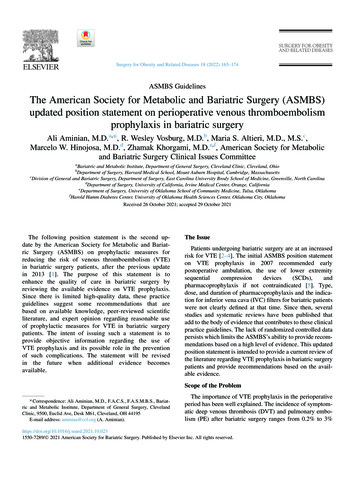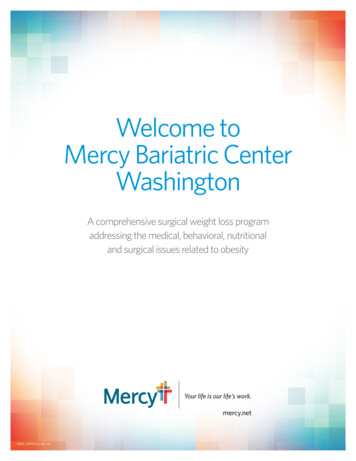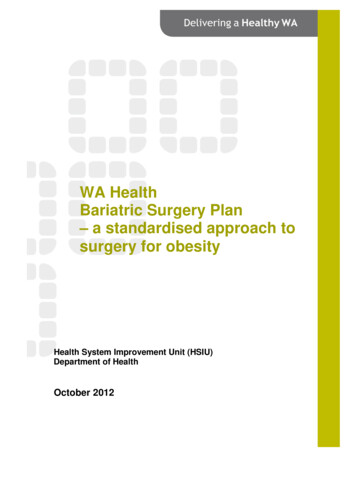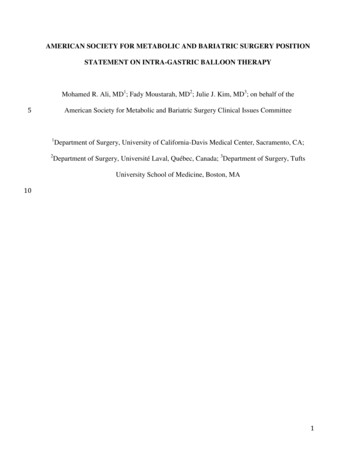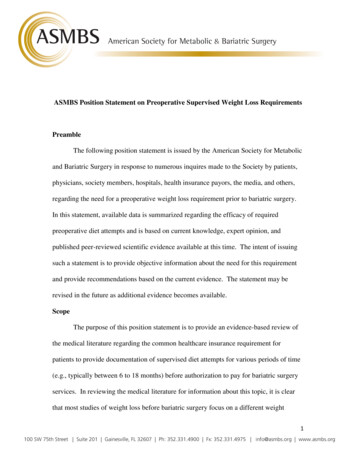
Transcription
American Society for Metabolic & Bariatric SurgeryASMBS Position Statement on Preoperative Supervised Weight Loss RequirementsPreambleThe following position statement is issued by the American Society for Metabolicand Bariatric Surgery in response to numerous inquires made to the Society by patients,physicians, society members, hospitals, health insurance payors, the media, and others,regarding the need for a preoperative weight loss requirement prior to bariatric surgery.In this statement, available data is summarized regarding the efficacy of requiredpreoperative diet attempts and is based on current knowledge, expert opinion, andpublished peer-reviewed scientific evidence available at this time. The intent of issuingsuch a statement is to provide objective information about the need for this requirementand provide recommendations based on the current evidence. The statement may berevised in the future as additional evidence becomes available.ScopeThe purpose of this position statement is to provide an evidence-based review ofthe medical literature regarding the common healthcare insurance requirement forpatients to provide documentation of supervised diet attempts for various periods of time(e.g., typically between 6 to 18 months) before authorization to pay for bariatric surgeryservices. In reviewing the medical literature for information about this topic, it is clearthat most studies of weight loss before bariatric surgery focus on a different weight1100 SW 75th Street Suite 201 Gainesville, FL 32607 Ph: 352.331.4900 Fx: 352.331.4975 info@asmbs.org www.asmbs.org
management initiative than is the purpose of this review, i.e., physician-mandated weightloss. Physician-mandated weight loss may be undertaken in individual patients toevaluate a patient’s ability to adhere to dietary changes and to comply with treatment, todecrease surgical risk, and/or to reduce the size of the liver and visceral fat load. For thesake of clarity, the level of evidence available for both pre-surgical diet managementpractices will be reviewed in the current document.BackgroundMedicare requires a period of preoperative dietary treatment for severe obesitybefore a patient is approved for bariatric surgery.(1) Most health insurance carriers,including those who administer the Medicare program, require 6 to 12 months or more ofrecent documentation of diet attempts before authorization is granted to provide coveragefor bariatric surgery services. This is mandated in the absence of any regard for theindividual patient’s history of past efforts and commonly without any expectation forsuccessful weight loss. Such policies typically ignore the patient’s health circumstancesrelated to morbid obesity and the status of potentially life-threatening comorbidconditions. Most policies require rigorously-documented physician encounters includingmonthly chart entries conforming to a specific format. Carriers often penalize patientswho miss a single monthly visit by forcing them to re-initiate the entire process. Thisprocess can be financially onerous, frustrating, and time-consuming for many patients.Medicare and many other payers do not pay for dietary treatment and patients must taketime off from work or family responsibilities to visit their physician. Programs such as2
Weight Watchers and Slim-Fast typically do not meet insurance carriers’requirements.Available DataAlmost all severely obese patients have been through numerous weight-lossprograms over many years, without long-term efficacy.(2, 3) There are only rare cases ofsuccessful long-term weight loss beyond 5 years for severely obese patients.(4)There are no Class I large, adequately powered randomized, prospective trials ormeta-analyses to validate the hypothesis that preoperative diet attempts improve bariatricsurgery outcomes. One small prospective study randomized 50 patients to lose 10%excess weight preoperatively versus 50 patients who had no such requirement. Sixty-onepatients ultimately underwent surgery and patients assigned to the weight loss group hadshorter operative times and enhanced weight loss at three months. There were nodifferences in complication rates between groups and, at six months, the excess weightloss was equivalent. (5) Results of the same study at one year demonstrated no differencesin weight, BMI, excess weight loss, or comorbidity reduction between groups.(6)Class II comparative studies have consistently demonstrated that patients whoachieve preoperative weight loss, regardless of the magnitude, do not have better longterm weight loss after bariatric surgery compared to groups with no weight loss or weightgain preoperatively. Additionally, the requirement for a 6 or 12 month pre-operativedietary management prior to bariatric surgery delays surgical care(7) and can reduce thenumber of patients who ultimately undergo bariatric surgery through attrition. (3, 8-12)3
There are some Class III studies (clinical series or case reviews) that support a 5to 10% diet-induced acute weight loss immediately (a month or two) prior to bariatricsurgery in order to decrease the size of the liver and visceral adipose tissue. This rapidpreoperative weight loss can facilitate the laparoscopic approach to the upper stomachand esophagus and may shorten operative time.(13-18) There is also some retrospectiveevidence that patients who lose 5-10% excess body weight prior to surgery have a higherprobability of a shorter hospital stay, may achieve more rapid postoperative weight loss,(13)and have fewer complications.(19) A few small studies have suggested thatpreoperative weight loss may lead to a better short-term weight loss outcomes(5, 16) butthese effects have not been demonstrated beyond one year of follow-up. A retrospectivereview of 353 patients after laparoscopic gastric bypass showed that preoperative weightloss did not decrease the operative time or the length of stay and did not affect the meannet postoperative weight loss nor the percent excess weight loss at one year. However,the group that had lost more than 10 pounds had fewer complications.(10) Another studythat retrospectively analyzed 539 patients found no relationship between preoperativeweight changes and excess weight loss 48 months after surgery, regardless of the surgicalprocedure performed, patient gender, or preoperative body mass index.(20)The California Department of Managed Health Care recently conducted a reviewof weight loss prior to bariatric surgery and concluded that “there is no literaturepresented by any authority that mandated weight loss, once a patient has been identifiedas a candidate for bariatric surgery, is indicated.” This comprehensive review states thatmandated weight loss prior to indicated bariatric surgery is without evidence-basedsupport, is not medically necessary, and that the risks of delaying bariatric surgery are4
real and measurable.(21) In this regard, there are now numerous studies documenting theefficacy of bariatric surgery to decrease many severe obesity-related co-morbidities,including type-2 diabetes mellitus.(22-24) There are 8 studies that document a decreasedmortality after bariatric surgery when compared to cohorts who have not undergone abariatric operation; two of these studies would be classified as Class I under theEvidence Based Medicine guidelines.(25-32) Furthermore, 3 studies have shown thatbariatric surgery is cost-effective and pays for itself within 2 ½ to 5 years after theoperation; a benefit that almost no other surgical procedure provides.(33-35)Summary and Recommendations1. There are no Class I studies or evidence-based reports that document the benefits of, orthe need for, a 6 to 12 month pre-operative dietary weight loss program before bariatricsurgery. The current evidence supporting preoperative weight loss involves physicianmandated weight loss to improve surgical risk or to evaluate patient adherence. Althoughmany believe there may be benefits to acute preoperative weight loss in the weeks beforebariatric surgery, the available Class II-IV data regarding acute weight loss prior tobariatric surgery are indeterminate and provide conflicting results leading to no clearconsensus at this time. Preoperative weight loss that is recommended by the surgeonand/or the multi-disciplinary bariatric treatment team due to an individual patient’s needsmay have value for the purposes of improving surgical risk or evaluating patientadherence , but is supported only by low-level evidence in the literature at the presenttime.5
2. One effect of mandated preoperative weight management prior to bariatric surgery isattrition of patients from bariatric surgery programs. This barrier to care is likely relatedto patient inconvenience, frustration, healthcare costs and lost income due to therequirement for repeated physician visits that are not covered by health insurance.It is the position of the ASMBS that the requirement for documentation of prolongedpreoperative diet efforts before health insurance carrier approval of bariatric surgeryservices is inappropriate, capricious, and counter-productive given the complete absenceof a reasonable level of medical evidence to support this practice. Policies such as thesethat delay, impede or otherwise interfere with life-saving and cost-effective treatment, ashave been proven to be true for bariatric surgery to treat morbid obesity, are unacceptablewithout supporting evidence. Individual surgeons and programs should be free torecommend preoperative weight loss based on the specific needs and circumstances ofthe patient.Pre-operative Dietary Weight Loss Requirement Prior to Bariatric Surgery PositionStatement and Standard of CareThis Position Statement is not intended to provide inflexible rules or requirementsof practice and is not intended, nor should it be used, to state or establish a local,regional, or national legal standard of care. Ultimately, there are various appropriatetreatment modalities for each patient, and surgeons must use their judgment in selectingfrom among the different feasible treatment options.6
The American Society for Metabolic and Bariatric Surgery cautions against theuse of this Position Statement in litigation in which the clinical decisions of a physicianare called into question. The ultimate judgment regarding the appropriateness of anyspecific procedure or course of action must be made by the physician in light of all thecircumstances presented. Thus, an approach that differs from the Position Statement,standing alone, does not necessarily imply that the approach was below the standard ofcare. To the contrary, a conscientious physician may responsibly adopt a course of actiondifferent from that set forth in the Position Statement when, in the reasonable judgmentof the physician, such a course of action is indicated by the condition of the patient, thelimitations of available resources, or advances in knowledge or technology. All thatshould be expected is that the physician will follow a reasonable course of action on thebasis of current knowledge, available resources, and the needs of the patient to delivereffective and safe medical care. The sole purpose of this Position Statement is to assistpractitioners in achieving this iewdecisionmemo.asp?id 1602.Gibbons LM, Sarwer DB, Crerand CE, et al. Previous weight loss experiences ofbariatric surgery candidates: how much have patients dieted prior to surgery?Surg Obes Relat Dis. 2006;2:159-64.3.Jantz EJ, Larson CJ, Mathiason MA, Kallies KJ, Kothari SN. Number of weightloss attempts and maximum weight loss before Roux-en-Y laparoscopic gastric7
bypass surgery are not predictive of postoperative weight loss. Surg Obes RelatDis. 2009;5:208-11.4.Marinilli Pinto A, Gorin AA, Raynor HA, Tate DF, Fava JL, Wing RR.Successful weight-loss maintenance in relation to method of weight loss. Obesity(Silver Spring). 2008;16:2456-61.5.Alami RS, Morton JM, Schuster R, et al. Is there a benefit to preoperative weightloss in gastric bypass patients? A prospective randomized trial. Surg Obes RelatDis. 2007;3:141-5; discussion 145-6.6.Solomon H, Liu GY, Alami R, Morton J, Curet MJ. Benefits to patients choosingpreoperative weight loss in gastric bypass surgery: new results of a randomizedtrial. J Am Coll Surg. 2009;208:241-5.7.Kuwada TS, Richardson S, Chaar ME, et al. Insurance-mandated medicalprograms before bariatric surgery: do good things come to those who wait? SurgObes Relat Dis. 2010 Sep 19. [Epub ahead of print].8.Jamal MK, DeMaria EJ, Johnson JM, et al. Insurance-mandated preoperativedietary counseling does not improve outcome and increases dropout rates inpatients considering gastric bypass surgery for morbid obesity. Surg Obes RelatDis. 2006;2:122-7.9.Carlin AM, O'Connor EA, Genaw JA, Kawar S. Preoperative weight loss is not apredictor of postoperative weight loss after laparoscopic Roux-en-Y gastricbypass. Surg Obes Relat Dis. 2008;4:481-5.8
10.Riess KP, Baker MT, Lambert PJ, Mathiason MA, Kothari SN. Effect ofpreoperative weight loss on laparoscopic gastric bypass outcomes. Surg ObesRelat Dis. 2008;4:704-8.11.Ali MR, Baucom-Pro S, Broderick-Villa GA, et al. Weight loss before gastricbypass: feasibility and effect on postoperative weight loss and weight lossmaintenance. Surg Obes Relat Dis. 2007;3:515-20.12.Harnisch MC, Portenier DD, Pryor AD, Prince-Petersen R, Grant JP, DeMaria EJ.Preoperative weight gain does not predict failure of weight loss or co-morbidityresolution of laparoscopic Roux-en-Y gastric bypass for morbid obesity. SurgObes Relat Dis. 2008;4:445-50.13.Still CD, Benotti P, Wood GC, et al. Outcomes of preoperative weight loss inhigh-risk patients undergoing gastric bypass surgery. Arch Surg. 2007;142:994-8;discussion 999.14.Liu RC, Sabnis AA, Forsyth C, Chand B. The effects of acute preoperative weightloss on laparoscopic Roux-en-Y gastric bypass. Obes Surg. 2005;15:1396-402.15.Huerta S, Dredar S, Hayden E, et al. Preoperative weight loss decreases theoperative time of gastric bypass at a Veterans Administration hospital. Obes Surg.2008;18:508-12.16.Alvarado R, Alami RS, Hsu G, et al. The impact of preoperative weight loss inpatients undergoing laparoscopic Roux-en-Y gastric bypass. Obes Surg.2005;15:1282-6.9
17.Eisenberg D, Duffy AJ, Bell RL. Does Preoperative Weight Change PredictPostoperative Weight Loss after Laparoscopic Roux-en-Y Gastric Bypass in theShort Term? J Obes. 2010; Epub 2009 Aug 31.18.Collins J, McCloskey C, Titchner R, et al. Preoperative weight loss in high-risksuperobese bariatric patients: a computed tomography-based analysis. Surg ObesRelat Dis. 2010 Nov 9. [Epub ahead of print].19.Benotti PN, Still CD, Wood GC, et al. Preoperative weight loss before bariatricsurgery. Arch Surg. 2009;144:1150-5.20.Becouarn G, Topart P, Ritz P. Weight loss prior to bariatric surgery is not a prerequisite of excess weight loss outcomes in obese patients. Obes edmhc/org/boards/cap/BariatricREV.pdf22.Maggard MA, Shugarman LR, Suttorp M, et al. Meta-analysis: surgical treatmentof obesity. Ann Intern Med 2005;142:547-59.23.Sugerman HJ. The pathophysiology of severe obesity and the effects of surgicallyinduced weight loss. Surg Obes Relat Dis 2005;1:109-19.24.Buchwald H, Estok R, Fahrbach K, et al. Weight and type 2 diabetes afterbariatric surgery: systemic review and meta-analysis. Am J Med 2009;122:24856.25.Sjostrom L, Narbro K, Karason K, et al. Effects of bariatric surgery on mortalityin Swedish obese subjects. N Engl J Med 2007;357:741-52.26.Adams T, Gress R, Smith S, et al. Long-term mortality after gastric bypasssurgery.N Engl J Med 2007;357:753-61.10
27.Peeters A, O’Brien P, Laurie C, et al. Substantial intentional weight loss andmortality in the severely obese. Ann Surg 2007;246:1028-33.28.Busetto L, Miribelli D, Petroni ML, et al. Comparative long-term mortality afterlaparoscopic adjustable gastric banding versus nonsurgical controls. Surg ObesRelat Dis 2007;3:496-502.29.Sowenimo OA, Yood SM, Courtney J, et al. Natural history of morbid obesitywithout surgical intervention. Surg Obes Relat Dis 2007;3:73-7.30.Christou NV, Sampalis JS, Liberman M, et al. Surgery decreases long-termmortality, morbidity, and health care use in morbidly obese patients. Ann Surg2004;240:416 –23.31.Flum DR, Dellinger EP. Impact of gastric bypass operation on survival: apopulation-based analysis. J Am Coll Surg 2004;199:543–51.32.MacDonald KG Jr, Long SD, Swanson MS, et al. The gastric bypass operationreduces the progression and mortality of noninsulin-dependent diabetes mellitus. JGastrointest Surg 1997;1:213–20.33.Cremieux P-Y, Buchwald H, Shikora S, Ghosh A, Yang HE, Buessing M. Astudy on the economic impact of bariatric surgery. Am J Manag Care2008;14:589-96.34.Sampalis JS, Liberman M, Auger S, Christou NV. The impact of weight reductionsurgery on health-care costs in morbidly obese patients. Obes Surg 2004;14:93947.11
35.Gallagher SF, Banasiak M, Gonzalvo JP, et al. The impact of bariatric surgery onthe Veterans Administration healthcare system: a cost analysis. Obes Surg2003;13:245-8.12
term weight loss after bariatric surgery compared to groups with no weight loss or weight gain preoperatively. Additionally, the requirement for a 6 or 12 month pre-operative dietary management prior to bariatric surgery delays surgical care(7) and can reduce the number of patients who ultimately undergo bariatric surgery through attrition. (3 .

